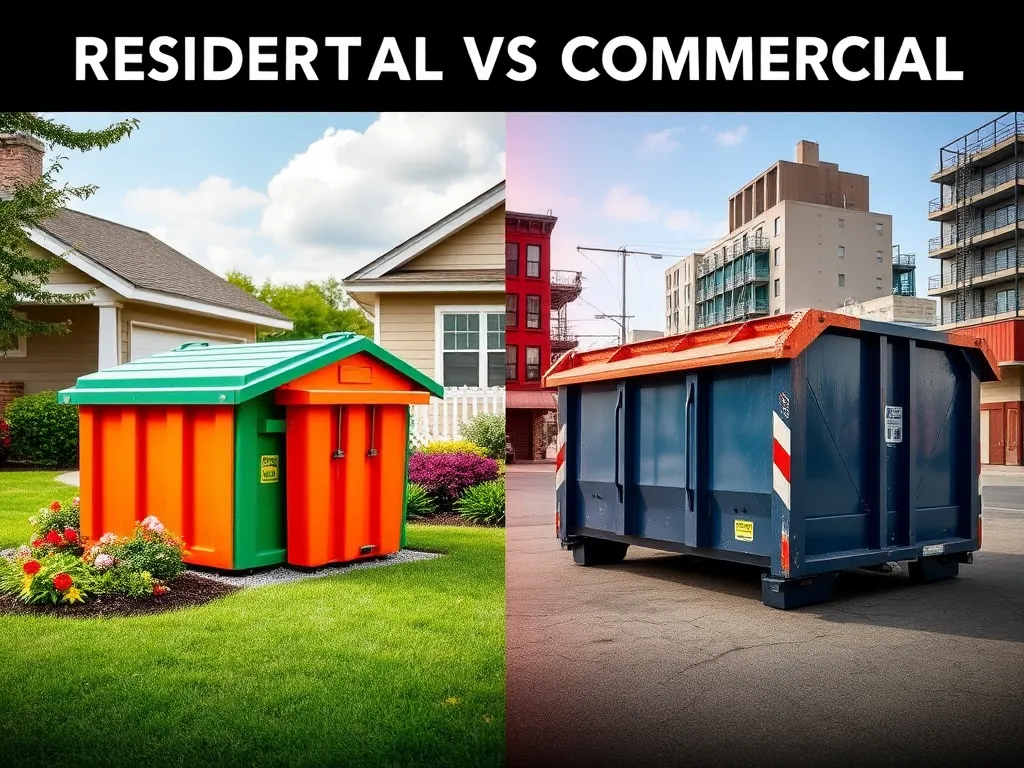Understanding Residential vs. Commercial Dumpsters: Key Differences

Understanding the Differences Between Residential and Commercial Dumpsters
When it comes to waste management, choosing the right type of dumpster is crucial for both residential and commercial properties. The debate of Residential vs. commercial dumpsters highlights the distinct needs and requirements of different environments. While both types serve the core purpose of waste disposal, they vary significantly in size, usage, and regulations, making it essential for users to understand what suits them best.
Residential dumpsters are primarily designed for home use, catering to individuals and families undertaking home renovation projects, cleanouts, or landscaping tasks. They typically come in smaller sizes, making them easier to fit in driveways or on streets without taking up too much space. On the other hand, commercial dumpsters are built for businesses, construction sites, and large-scale operations that generate significant waste. Knowing the needs tied to each type helps consumers make informed choices in terms of efficiency and cost-effectiveness.
Both residential and commercial dumpsters offer unique benefits, but knowing when to use which can greatly affect project outcomes. Residential dumpsters provide a convenient solution for homeowners looking to manage waste during renovations or clean-ups. In contrast, commercial dumpsters are integral to maintaining cleanliness and compliance in business environments, from restaurants to construction sites. This critical difference marks one of the many factors that influence which dumpster type to utilize for your waste disposal needs.
For an effective waste management solution, understanding various options is crucial; explore the available choices at https://www.garlandtx.gov/3772/Dumpster-Sizes.
In the conversation around Residential vs. commercial dumpsters, it's also essential to recognize the nuances in local regulations and disposal needs. Different jurisdictions may have specific codes governing what can and cannot be disposed of in these dumpsters. Knowledge of these regulations ensures both residential and commercial users comply with legal requirements while promoting efficient waste management practices. As such, understanding these distinctions is vital for effective waste disposal.
Ultimately, discerning whether to rent a residential or commercial dumpster can make a significant impact on both project costs and effectiveness. As businesses and homeowners increasingly focus on sustainability and proper waste separation, knowing the differences and appropriate uses for each type can lead to better environmental practices and contribute to cleaner communities in the long run.
Understanding Residential Dumpsters
Residential dumpsters come in various sizes, typically ranging from 10 to 40 cubic yards. Smaller options (like 10 or 20 yards) are ideal for home cleanouts, while larger ones (like 30 or 40 yards) are suited for major remodeling projects or large cleanouts. Most residential dumpsters are available for short-term rental, accommodating the needs of homeowners during specific project timelines.
Common uses for residential dumpsters include home renovations, garage cleanouts, landscaping projects, and spring cleaning. These dumpsters make it easy for homeowners to dispose of all types of waste, from construction debris to household items that are no longer needed. Having a designated dumpster on-site ensures the work area remains organized and safe throughout the project.
The benefits of using residential dumpsters are numerous. They provide a straightforward solution to waste management, saving homeowners time and effort associated with multiple trips to the landfill. Residential dumpsters also minimize the risk of injury on-site, as workers can dispose of heavy debris without much hassle. In addition, many rental services prioritize recycling and responsible waste disposal practices, encouraging eco-friendly behaviors.
Cost considerations for residential dumpsters vary based on size, rental duration, and local regulations. Homeowners should compare rental quotes and be aware of any additional fees, such as disposal costs for certain materials. Budgeting for a residential dumpster is crucial, as it can often be more economical than continuously making trips to the landfill, especially for larger projects.
Exploring Commercial Dumpsters
Commercial dumpsters generally come in larger sizes, ranging from 2 to 8 cubic yards to accommodate the significant waste output from businesses. The most common types include front-load, rear-load, and roll-off dumpsters. Businesses can choose the type that best fits their location, volume of waste production, and frequency of disposal needs.
In various industries, commercial dumpsters play a pivotal role in maintaining cleanliness and organization. Restaurants, retail stores, construction sites, and office complexes utilize these dumpsters to efficiently manage waste generated during their daily operations. Regular waste collection tailored to the specific needs of these industries ensures compliance with local regulations and promotes an environmentally-friendly approach to waste management.
Recycling and waste disposal in commercial settings are critical for reducing environmental footprints. Many businesses are adopting waste separation practices and using commercial dumpsters designed to accommodate recyclables alongside regular waste. This dual approach promotes a culture of sustainability and helps businesses comply with evolving regulatory requirements around waste management.
Cost benefits of commercial dumpsters include the potential for discounted rates for businesses that generate a high volume of waste. Regular contracts with waste disposal services often lead to savings compared to ad-hoc waste disposal. Furthermore, having a set schedule for waste collection helps businesses avoid unexpected costs associated with overfilled dumpsters or missed collections, leading to reduced operational disruptions.
Key Differences Between Residential and Commercial Dumpsters
Size differences between residential and commercial dumpsters are noteworthy. Residential dumpsters typically range from 10 to 40 yards, while commercial dumpsters can be smaller (2 yards) or larger (up to 8 yards or more). Understanding the size required for your particular project or business is crucial for efficient waste management.
Typical waste types handled in residential dumpsters often include household items, construction debris, and yard waste, while commercial dumpsters manage a wide variety of waste streams, including food waste, packaging materials, and industrial byproducts. This diversity affirms the necessity of differentiating between the two types to avoid contamination and ensure responsible disposal methods are adhered to.
Regulatory requirements for residential and commercial dumpsters can vary widely by location and type of waste. Businesses often must adhere to stricter waste management regulations, including food safety laws for restaurants, whereas residential users typically face become more concerned with disposal types and exceeding weight limits. Understanding local requirements is vital for both types to uphold compliance and minimize legal hassles.
The impact on community waste management varies based on whether residential or commercial dumpsters are utilized. Commercial dumpsters, when effectively managed, can lead to reduced landfill contributions as businesses adopt more recycling practices. In contrast, residential waste often requires community systems to process single-family disposal, where excess waste might get overlooked without proper management.
Choosing the Right Dumpster for Your Needs
When choosing the right dumpster for your needs, consider various factors, such as project size, waste type, and duration for which you'll need the dumpster. Assess the waste volume upfront, as this will guide you in selecting an appropriate size—whether you are tidying up your home or handling a large commercial renovation.
Assessing project size and waste type is critical in narrowing down options. For homeowners, estimating the volume of junk and debris can inform whether to opt for a smaller residential dumpster or larger one for more extensive projects. Businesses should evaluate their waste generation patterns to choose the right dumpster that aligns with regular activities.
Comparing rental services for both types is essential before making a decision. Evaluate local service providers to find the most reputable options, checking for customer reviews, pricing, and extra services offered, such as recycling programs or flexible contract lengths.
Environmental considerations in dumpster choice should not be overlooked. Opting for services that prioritize recycling and responsible waste disposal can help contribute to overall waste reduction efforts. Moreover, choosing local services can reduce the carbon footprint associated with transporting waste, contributing to greener waste management solutions.
Waste Management Strategies for Residential and Commercial Properties
Best practices for residential waste management often involve regular cleanouts, maintaining designated disposal areas, and following local waste separation guidelines. Setting up a plan for routine household cleanups and staying organized ensures that waste doesn't accumulate and creates a safer, more pleasant living environment.
Commercial waste management techniques may include scheduled collections, recycling initiatives, and employee involvement programs for waste reduction. Many businesses are now equipping employees with the necessary tools and guidance to assist in effective waste disposal, further promoting a sustainable workplace culture.
Reducing landfill impact from both residential and commercial dumpsters can involve recycling, composting, and waste reduction initiatives. Both homeowners and businesses can take meaningful steps towards minimizing the amount of waste sent to landfills by educating themselves on best practices and local disposal regulations.
Innovative solutions for efficient waste disposal include utilizing technology for tracking waste disposal behaviors, implementing waste-to-energy programs, and deploying smart dumpster solutions that help in monitoring waste volume in real-time. These cutting-edge strategies promote efficiency and sustainability in waste management practices.
